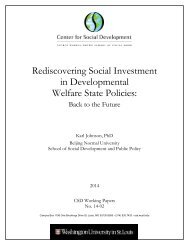Exploring and Assessing Intercultural Competence - Center for ...
Exploring and Assessing Intercultural Competence - Center for ...
Exploring and Assessing Intercultural Competence - Center for ...
Create successful ePaper yourself
Turn your PDF publications into a flip-book with our unique Google optimized e-Paper software.
<strong>Exploring</strong> <strong>and</strong> <strong>Assessing</strong> <strong>Intercultural</strong> <strong>Competence</strong><br />
Whereas the term ICC is increasingly used in the field of intercultural communication, it<br />
represents only one term among many that are still used to address what transpires during<br />
intercultural encounters. And even those who employ the notion of ICC at all, do not necessarily<br />
intend to signify the same abilities. A glance at some of the terms used (there are many more)<br />
helps to illustrate their diversity. Yet, most terms allude to only limited aspects of a more<br />
complex phenomenon; <strong>for</strong> example: cross-cultural awareness, global competitive intelligence,<br />
cultural competence, cultural sensitivity, ethno-relativity, international competence, intercultural<br />
interaction, biculturalism, <strong>and</strong> multiculturalism, <strong>and</strong> so <strong>for</strong>th (cf. Appendix D: Alternate Terms<br />
<strong>for</strong> ICC). Some of these stress global knowledge, others sensitivity, still others point to certain<br />
skills. From our long involvement in the field of intercultural communication, we knew that most<br />
existing terms, definitions, <strong>and</strong> concepts in use do not adequately capture all that occurs when<br />
individuals engage in intercultural contact. Lacking any unifying concept, it is not surprising,<br />
there<strong>for</strong>e, that so many different instruments are being created to measure its outcomes (cf:<br />
Appendix F: Assessment Tools ICC). But the instruments themselves, of course, are only as good<br />
as the concepts they attempt to measure.<br />
For these reasons, we began by attempting to establish parameters <strong>for</strong> an exp<strong>and</strong>ed notion of ICC<br />
used in this study. Expectedly, we began with an extensive review of the intercultural literature –<br />
138 articles <strong>and</strong> books to date – to ascertain areas of convergence <strong>and</strong> divergence regarding ICC.<br />
We compared these findings with the ideas we held, in<strong>for</strong>med by our academic <strong>and</strong> empirical<br />
work in the field over many years. These ef<strong>for</strong>ts resulted in a far more holistic <strong>and</strong> comprehensive<br />
construct than any found in the literature (cf. Appendix E: <strong>Exploring</strong> <strong>Intercultural</strong> <strong>Competence</strong>: A<br />
Construct Proposal). This construct, in turn, provided the basis <strong>for</strong> revising the survey<br />
questionnaire <strong>for</strong>m employed in this study (cf. Appendix G: Survey Form (American English<br />
Original)).<br />
As a result, the fundamental perspective undergirding this entire ef<strong>for</strong>t is its concept of<br />
intercultural competence, briefly defined as: “. . . a complex of abilities needed to per<strong>for</strong>m<br />
effectively <strong>and</strong> appropriately when interacting with others who are linguistically <strong>and</strong><br />
culturally different from oneself.” The notions “effective” <strong>and</strong> “appropriate” are equally<br />
important because they acknowledge both “etic” <strong>and</strong> “emic” perspectives – that of self <strong>and</strong> other,<br />
so important in intercultural work, while also reducing problems of self-report by including the<br />
views of both sojourners <strong>and</strong> hosts regarding outcomes.<br />
This brief definition, of course, implicitly includes the following components:<br />
• various characteristics;<br />
• three areas or domains (i.e., relationships, communication, <strong>and</strong> collaboration;<br />
• four dimensions (i.e., knowledge, attitude, skills, <strong>and</strong> awareness);<br />
• host language proficiency;<br />
• developmental levels.<br />
A comprehensive survey questionnaire <strong>for</strong>m incorporated all of these areas, including an<br />
important question often ignored, which is the correlation between developing levels of host<br />
language proficiency <strong>and</strong> other areas of second competence development. While everyone agrees<br />
that both language <strong>and</strong> culture are interrelated, interculturalists tend to overlook the relevance of<br />
host language proficiency <strong>and</strong> language educators to overlook the relevance of ICC abilities.<br />
Creation of the word “linguaculture” (cf: Fantini, IJIR p.149) signals the integrated concept<br />
employed in this study <strong>and</strong> signals an integrated perspectives; while use of the ACTFL Language<br />
<strong>Center</strong> <strong>for</strong> Social Development<br />
Washington University in St. Louis<br />
9
















